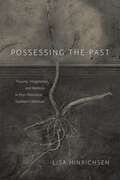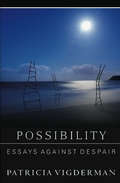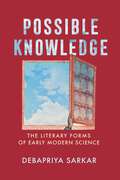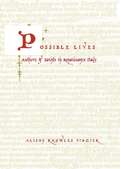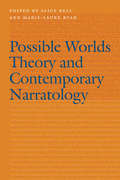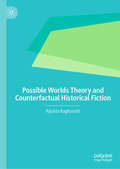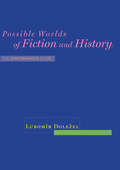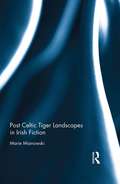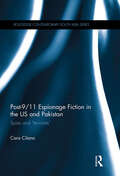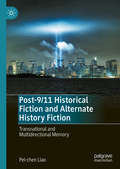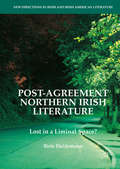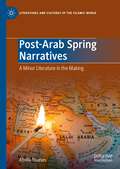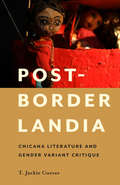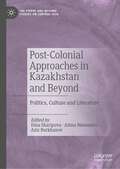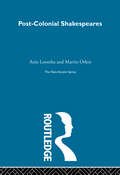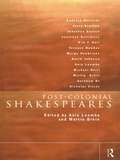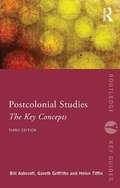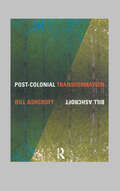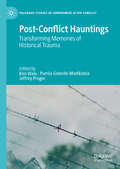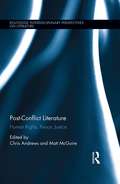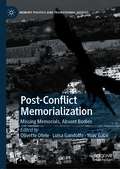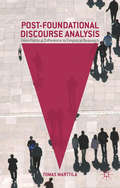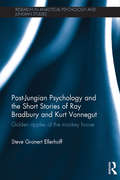- Table View
- List View
Possessing the Past: Trauma, Imagination, and Memory in Post-Plantation Southern Literature (Southern Literary Studies)
by Lisa HinrichsenEmploying recent theories of memory from multiple areas of study, Possessing the Past illuminates the tangled relationships among trauma, fantasy, and the public sphere, and their impact on the "South" in imagination and in reality. Focusing on the roles that narrative and fantasy play in creating a sense of regional distinctiveness, Lisa Hinrichsen brings a wealth of critical scholarship to her consideration of memory and southern literature. Hinrichsen's nuanced readings of a diverse group of southern authors, including William Faulkner, Roberto Fernández, Erna Brodber, Monique Truong, and Katharine Du Pre Lumpkin, offer new ways of conceptualizing memory, place, and history. She unravels southern literature's critical confrontation with the region's history through complex systems of remembrance and erasure, and she traces how fantasy mediates trauma and adjudicates identity. Expansive in its psychoanalytical approach, her work explores issues of law, testimony, and social justice; the role of nostalgic fantasies of gentility at midcentury; the relationship between white empathy and social fantasy; the resemblance of regional patterns of disavowal to national ideologies of forgetting in Vietnam-era fiction; and the impact of contemporary multicultural literature on memory and community. Possessing the Past broadens the theoretical framework used to conceptualize memory and trauma, while grounding traumatic testimony in the specifics of time and place amply offered by southern literature. It provides new readings of an array of southern writers and deepens our understanding of the continuing importance of history, memory, and fantasy in the literature of the U.S. South.
Possibility: Essays Against Despair
by Patricia Vigderman"Reading Patricia Vigderman is like attending an ideal dinner party, where everyone has read your favorite books. Her essays wind particular passages of Proust, or George Eliot, or W.G. Sebald around personal moments; David Foster Wallace's story 'The Depressed Person' is threaded throughout an essay about her own relationship with a loved one's serious depression. Vigderman's responses are fresh and original and her sounding of our collective literary treasures are likely to send you back to read them again, now overlaid with her embroidery."-Mona SimpsonIn this accessible collection of essays, Patricia Vigderman attempts to translate some of life's disordered events into the orderly happiness of art. She encounters manatees, children, and snakes; with Henry Adams, Marcel Proust, and W.G. Sebald; with Texas landscape, Vertigo, and Johannes Vermeer. Adams, in Japan after his wife's death, found in the elaborate ritual of the tea ceremony and in the discomforts of a rural inn, occasions for the wit to face down grief. His letters to friends coax laughter from strangeness and loss. Like Adams, Vigderman has a stylist's passion for revelatory detail, and for the pleasure of immersion in a world. Smart, generous, and probing, her discoveries play with direct experience, exploring the interaction of life and art as "magic you can walk in and out of."Patricia Vigderman's work has appeared in The Nation, The New York Times, Georgia Review, Raritan, and others. She was a Literature Fellow at the Liguria Center for the Arts and Humanities in Italy and teaches at Kenyon College.
Possible Knowledge: The Literary Forms of Early Modern Science
by Debapriya SarkarThe Renaissance, scholars have long argued, was a period beset by the loss of philosophical certainty. In Possible Knowledge, Debapriya Sarkar argues for the pivotal role of literature—what early moderns termed poesie—in the dynamic intellectual culture of this era of profound incertitude. Revealing how problems of epistemology are inextricable from questions of literary form, Sarkar offers a defense of poiesis, or literary making, as a vital philosophical endeavor.Working across a range of genres, Sarkar theorizes “possible knowledge” as an intellectual paradigm crafted in and through literary form. Sixteenth- and seventeenth-century writers such as Spenser, Bacon, Shakespeare, Cavendish, and Milton marshalled the capacious concept of the “possible,” defined by Philip Sidney as what “may be and should be,” to construct new theories of physical and metaphysical reality. These early modern thinkers mobilized the imaginative habits of thought constitutive to major genres of literary writing—including epic, tragedy, romance, lyric, and utopia—in order to produce knowledge divorced from historical truth and empirical fact by envisioning states of being untethered from “nature” or reality.Approaching imaginative modes such as hypothesis, conjecture, prediction, and counterfactuals as instruments of possible knowledge, Sarkar exposes how the speculative allure of the “possible” lurks within scientific experiment, induction, and theories of probability. In showing how early modern literary writing sought to grapple with the challenge of forging knowledge in an uncertain, perhaps even incomprehensible world, Possible Knowledge also highlights its most audacious intellectual ambition: its claim that while natural philosophy, or what we today term science, might explain the physical world, literature could remake reality. Enacting a history of ideas that centers literary studies, Possible Knowledge suggests that what we have termed a history of science might ultimately be a history of the imagination.
Possible Lives: Authors and Saints in Renaissance Italy
by Alison Knowles FrazierPossible Lives uses the saints'lives written by humanists of the Italian Renaissance to explore the intertwining of classical and religious cultures on the eve of the European Reformation. The lives of saints were among the most reproduced and widely distributed literatures of medieval and early modern Europe. During the century before the Reformation, these narratives of impossible goodness fell into the hands of classicizing intellectuals known as humanists. This study examines how the humanist authors received, criticized, and rewrote the traditional stories of exemplary virtue for patrons and audiences who were surprisingly open to their textual experiments. Drawn from a newly constructed catalog of primary sources in manuscript and print, the cases in this book range from the lure of martyrdom as the West confronted Islam to the use of saints'lives in local politics and the rhetorician's classroom. Frazier discusses the writers'perceptions of historical sanctity, the commanding place of the mendicant friars, and one unique account of a contemporary holy woman.Possible Lives shows that the classical Renaissance was also a saintly Renaissance, as humanists deployed their rhetorical and philological skills to "renew the persuasive force of Christian virtue" and "save the cult of the saints." Combining quantitative and anecdotal approaches in a highly readable series of case studies, Frazier reveals the contextual richness of this little-known and unexpectedly large body of Latin hagiography.
Possible Worlds Theory and Contemporary Narratology (Frontiers of Narrative)
by Marie-Laure Ryan Alice BellThe notion of possible worlds has played a decisive role in postclassical narratology by awakening interest in the nature of fictionality and in emphasizing the notion of world as a source of aesthetic experience in narrative texts. As a theory concerned with the opposition between the actual world that we belong to and possible worlds created by the imagination, possible worlds theory has made significant contributions to narratology.Possible Worlds Theory and Contemporary Narratology updates the field of possible worlds theory and postclassical narratology by developing this theoretical framework further and applying it to a range of contemporary literary narratives. This volume systematically outlines the theoretical underpinnings of the possible worlds approach, provides updated methods for analyzing fictional narrative, and profiles those methods via the analysis of a range of different texts, including contemporary fiction, digital fiction, video games, graphic novels, historical narratives, and dramatic texts. Through the variety of its contributions, including those by three originators of the subject area—Lubomír Doležel, Thomas Pavel, and Marie-Laure Ryan—Possible Worlds Theory and Contemporary Narratology demonstrates the vitality and versatility of one of the most vibrant strands of contemporary narrative theory.
Possible Worlds Theory and Counterfactual Historical Fiction
by Riyukta RaghunathThis book offers a comprehensive Possible Worlds framework with which to analyse counterfactual historical fiction. Counterfactual historical fiction is a literary genre that comprises narratives set in worlds whose histories run contrary to the history of our world, usually speculating on what would have happened had a significant historical event (such as a war) turned out differently. The author develops a systematic critical approach based on a customised model of Possible Worlds Theory supplemented by cognitive concepts that account for the different processes that readers go through when they read counterfactual historical fiction, a genre which relies heavily on pre-existing knowledge about history and culture. This book will be of interest to anyone working with Possible Worlds, including within the fields of philosophy, literary studies, stylistics, cognitive poetics, and narratology.
Possible Worlds of Fiction and History: The Postmodern Stage
by Lubomír DoleželWith Possible Worlds of Fiction and History, Lubomír Doležel reexamines the claim—made first by Roland Barthes and then popularized by Hayden White—that "there is no fundamental distinction between fiction and history." Doležel rejects this assertion and demonstrates how literary and discourse theory can help the historian to restate the difference between fiction and history. He challenges scholars to reassess the postmodern viewpoint by reintroducing the idea of possible worlds. Possible-worlds semantics reveals that possible worlds of fiction and possible worlds of history differ in their origins, cultural functions, and structural and semantic features. Doležel’s book is the first systematic application of this idea to the theory and philosophy of history.Possible Worlds of Fiction and History is the crowning work of one of literary theory’s most engaged thinkers.
Possum's Bare Tail (Houghton Mifflin Reading Leveled Readers)
by Jiang Qingling"In this story, the animals act like people. After reading the story think about what you have read: 1 What is Possum like at the beginning of the folktail? 2 What is Rabbit's plan to cure Possum of his pride? 3 What do you think of Rabbit's plan? 4 How does one of Possum's special talents help him at the end of the folktale?"
Post Celtic Tiger Landscapes in Irish Fiction
by Marie MianowskiPost Celtic Tiger Landscapes in Irish Fiction discusses the representations of place and landscape in Irish fiction since 2008. It includes novels and short stories by William Trevor, Dermot Bolger, Anne Enright, Donal Ryan, Claire Kilroy, Kevin Barry, Gerard Donovan, Danielle McLaughlin, Trisha McKinney, Billy O’Callaghan and Colum McCann. In the light of writings by geographers, anthropologists and philosophers such as Doreen Massey, Tim Ingold, Giorgio Agamben and Jeff Malpas, this book looks at the metamorphoses of place and landscape representations in fiction by confirmed or debut authors, in the aftermath of a crisis with deep economic as well as cultural consequences for Irish society. It shows what place and landscape representations reveal of the past, while discussing the way notions such as boundedness, openness and emergence can contribute to thinking out space and place and designing future landscapes.
Post-9/11 Espionage Fiction in the US and Pakistan: Spies and "Terrorists" (Routledge Contemporary South Asia Series)
by Cara N. CilanoAs the events of 11 September 2001 and their aftermath influence new developments in spy fiction as a popular genre, an examination of these literary narratives concerned with espionage and terrorism can reshape our approach to non-fictive representations of the same concerns. Post-9/11 Espionage Fiction in the US and Pakistan examines post-9/11 American spy fictions alongside Pakistani novels that draw upon many of the same figures, tropes, and conventions. As the Pakistani texts re-place spy fiction’s conventions, they offer another vantage point from which to view the affective appeals common to these conventions’ usual deployment in American texts. This book argues that the appropriation by Pakistani writers of these conventions insistently tracks how the formulaic and popular nature of post-9/11 American espionage thrillers forwards and reinforces "appropriate" affective responses, often linked to domestic sites and relations, to "terrorism." It also analyses and compares American and Pakistani representations of the twinned figures of the spy (or his proxy) and the "terrorist," a term frequently conflated with fundamentalist. The insights of these analyses can serve as interpretive interruptions of non-fictive representations of Pakistani-US "war on terror" relations. Offering an innovative analysis of the reflection of narrative conventions in our view of the real-life events, this book will attract scholars with an interest in Pakistani literature, Postcolonial literature, Asian Studies and Terrorism studies.
Post-9/11 Historical Fiction and Alternate History Fiction: Transnational and Multidirectional Memory
by Pei-chen LiaoDrawing on theories of historiography, memory, and diaspora, as well as from existing genre studies, this book explores why contemporary writers are so fascinated with history. Pei-chen Liao considers how fiction contributes to the making and remaking of the transnational history of the U.S. by thinking beyond and before 9/11, investigating how the dynamics of memory, as well as the emergent present, influences readers’ reception of historical fiction and alternate history fiction and their interpretation of the past. Set against the historical backdrop of WWII, the Vietnam War, and the War on Terror, the novels under discussion tell Jewish, Japanese, white American, African, Muslim, and Native Americans’ stories of trauma and survival. As a means to transmit memories of past events, these novels demonstrate how multidirectional memory can be not only collective but connective, as exemplified by the echoes that post-9/11 readers hear between different histories of violence that the novels chronicle, as well as between the past and the present.
Post-Agreement Northern Irish Literature
by Birte HeidemannThis book uncovers a new genre of 'post-Agreement literature', consisting of a body of texts - fiction, poetry and drama - by Northern Irish writers who grew up during the Troubles but published their work in the aftermath of the Good Friday Agreement. In an attempt to demarcate the literary-aesthetic parameters of the genre, the book proposes a selective revision of postcolonial theories on 'liminality' through a subset of concepts such as 'negative liminality', 'liminal suspension' and 'liminal permanence. ' These conceptual interventions, as the readings demonstrate, help articulate how the Agreement's rhetorical negation of the sectarian past and its aggressive neoliberal campaign towards a 'progressive' future breed new forms of violence that produce liminally suspended subject positions.
Post-Apocalyptic Culture
by Teresa HeffernanIn Post-Apocalyptic Culture, Teresa Heffernan poses the question: what is at stake in a world that no longer believes in the power of the end? Although popular discourse increasingly understands apocalypse as synonymous with catastrophe, historically, in both its religious and secular usage, apocalypse was intricately linked to the emergence of a better world, to revelation, and to disclosure.In this interdisciplinary study, Heffernan uses modernist and post-modernist novels as evidence of the diminished faith in the existence of an inherently meaningful end. Probing the cultural and historical reasons for this shift in the understanding of apocalypse, she also considers the political implications of living in a world that does not rely on revelation as an organizing principle.With fascinating readings of works by William Faulkner, Don DeLillo, Ford Madox Ford, Toni Morrison, E.M. Forster, Salman Rushdie, D.H. Lawrence, and Angela Carter, Post-Apocalyptic Culture is a provocative study of how twentieth-century culture and society responded to a world in which a belief in the end had been exhausted.
Post-Arab Spring Narratives: A Minor Literature in the Making (Literatures and Cultures of the Islamic World)
by Abida YounasThis book looks at eight post Arab Spring novels in the context of Gilles Deleuze’s and Félix Guattari’s theory of minor literature. Ahdaf Soueif, Hisham Matar, Karim Alrawi, Youssef Rakha, Yasmine El Rashidi, Omar Rober Hamilton, Saleem Haddad, and Nada Awar Jarrar all focus on the Arab world in their work; on the lives of ordinary and minority peoples; and on the revolutions of their respective nations. This volume shows how these contemporary Anglo-Arab novelists exhibit linguistic experimentation akin to Deleuze’s and Guattari’s theory of ‘deterritorialization’, but in a way that is unique to Anglo-Arab writing. The selected novelists repudiate the use of metamorphosis, which is usually an essential part of the deterritorialization of a major language. Instead, their writings enact the minor practice of linguistic deterritorialization by using metaphor and by incorporating contemporary modes of protest like popular slogans, tweets, and chants. These authors challenge the conventions of minor literature and, by adopting this mode of deterritorialization, foreground the experiences of officially silenced voices.
Post-Borderlandia: Chicana Literature and Gender Variant Critique (Latinidad: Transnational Cultures in the United States)
by T. Jackie CuevasBringing Chicana/o studies into conversation with queer theory and transgender studies, Post-Borderlandia examines why gender variance is such a core theme in contemporary Chicana and Chicanx narratives. It considers how Chicana butch lesbians and Chicanx trans people are not only challenging heteropatriarchal norms, but also departing from mainstream conceptions of queerness and gender identification. Expanding on Gloria Anzaldúa’s classic formulation of the Chicana as transformer of the “borderlands,” Jackie Cuevas explores how a new generation of Chicanx writers, performers, and filmmakers are imagining a “post-borderlands” subjectivity, where shifting national, racial, class, sexual, and gender identifications produce complex power dynamics. In addition, Cuevas offers fresh archival analysis of the Chicana feminist canon to reveal how queer gender variance has always been crucial to this literary tradition.
Post-Colonial Approaches in Kazakhstan and Beyond: Politics, Culture and Literature (The Steppe and Beyond: Studies on Central Asia)
by Dina Sharipova Alima Bissenova Aziz BurkhanovThis book explores the postcolonial discourse and decolonization processes in modern Kazakhstan and beyond. It pays particular attention to such areas as national and religious identity, language, literature, and historical narratives. Despite the fact that the post-colonial theory initially emerged in other regions of the world, it has increasingly been applied in the scholarship on Central Asia. Exploring recent debates on post-coloniality in Kazakhstan, this book is an attempt to bring together two bodies of scholarly literature: scholarship on culture and society in post-Soviet Central Asia and research on post-colonial theory. This volume will be of interest to scholars of Eurasian studies as well as researchers and students of post-colonialism in various contexts beyond Eurasia.
Post-Colonial Shakespeares (New Accents Ser.)
by Ania Loomba Martin OrkinFirst published in 2002. Routledge is an imprint of Taylor & Francis, an informa company.
Post-Colonial Shakespeares (New Accents)
by Ania Loomba Martin OrkinPostcolonial Shakespeares is an exciting step forward in the dialogue between postcolonial studies and Shakespearean criticism. This unique volume features original work by some of the leading critics within the growing field of Shakespeare studies and is the most authoritative collection on this topic to date. This study explores: * the colonial and racial discourses emerging in early modern Britain * how the Shakespearean text later became a colonial battlefield * how Shakespeare circulates in our post- and neo-colonial world today This collection of new essays traces the connections between early modern and contemporary vocabularies of colonization, 'race' and nationhood.
Post-Colonial Studies: The Key Concepts (Routledge Key Guides #145)
by Bill Ashcroft Helen Tiffin Gareth GriffithsThis hugely popular A-Z guide provides a comprehensive overview of the issues which characterize post-colonialism: explaining what it is, where it is encountered and the crucial part it plays in debates about race, gender, politics, language and identity. For this third edition over thirty new entries have been added including: Cosmopolitanism Development Fundamentalism Nostalgia Post-colonial cinema Sustainability Trafficking World Englishes. Post-Colonial Studies: The Key Concepts remains an essential guide for anyone studying this vibrant field.
Post-Colonial Transformation: Transformations Of Colonial Culture (Writing Past Colonialism Ser.)
by Bill AshcroftIn his new book, Bill Ashcroft gives us a revolutionary view of the ways in which post-colonial societies have responded to colonial control.The most comprehensive analysis of major features of post-colonial studies ever compiled, Post-Colonial Transformation:* demonstrates how widespread the strategy of transformation has been* investigates political and literary resistance* examines the nature of post-colonial societies' engagement with imperial language, history, allegory, and place* offers radical new perspectives in post-colonial theory in principles of habitation and horizonality.Post-Colonial Transformation breaks new theoretical ground while demonstrating the relevance of a wide range of theoretical practices, and extending the exploration of topics fundamentally important to the field of post-colonial studies.
Post-Conflict Hauntings: Transforming Memories of Historical Trauma (Palgrave Studies in Compromise after Conflict)
by Pumla Gobodo-Madikizela Jeffrey Prager Kim WaleThis book engages the globally pressing question of how to live and work with the haunting power of the past in the aftermath of mass violence. It brings together a collection of interdisciplinary contributions to reflect on the haunting of post-conflict memory from the perspective of diverse country case studies including South Africa, Rwanda, Zimbabwe, Northern Ireland, North and South Korea, Palestine and Israel, America and Australia. Contributions offer theoretical, empirical and practical insights on the nature of historical trauma and practices of collective healing and repair that include embodied, artistic and culturally relevant forms of wisdom for dealing with the past. While this question has traditionally been explored through the lens of trauma studies in relation to the post-Holocaust experience, this book provides new understandings from a variety of different historical contexts and disciplinary perspectives. Its chapters draw on, challenge and expand the trauma concept to propose more contextually relevant frameworks for transforming haunted memory in the aftermath of historical trauma.
Post-Conflict Literature: Human Rights, Peace, Justice (Routledge Interdisciplinary Perspectives on Literature)
by Chris Andrews Matt McGuireThis book brings together a variety of perspectives to explore the role of literature in the aftermath of political conflict, studying the ways in which writers approach violent conflict and the equally important subject of peace. Essays put insights from Peace and Conflict Studies into dialog with the unique ways in which literature attempts to understand the past, and to reimagine both the present and the future, exploring concepts like truth and reconciliation, post-traumatic memory, historical reckoning, therapeutic storytelling, transitional justice, archival memory, and questions about victimhood and reparation. Drawing on a range of literary texts and addressing a variety of post-conflict societies, this volume charts and explores the ways in which literature attempts to depict and make sense of this new philosophical terrain. As such, it aims to offer a self-conscious examination of literature, and the discipline of literary studies, considering the ability of both to interrogate and explore the legacies of political and civil conflict around the world. The book focuses on the experience of post-Apartheid South Africa, post-Troubles Northern Ireland, and post-dictatorship Latin America. The recent history of these regions, and in particular their acute experience of ethno-religious and civil conflict, make them highly productive contexts in which to begin examining the role of literature in the aftermath of social trauma. Rather than a definitive account of the subject, the collection defines a new field for literary studies, and opens it up to scholars working in other regional and national contexts. To this end, the book includes essays on post-1989 Germany, post-9/11 United States, the Israeli-Palestinian conflict, Sierra Leone, and narratives of asylum seeker/refugee communities. This volume’s comparative frame draws on well-established precedents for thinking about the cultural politics of these regions, making it a valuable resource for scholars of Comparative Literature, Peace and Conflicts Studies, Human Rights, Transitional Justice, and the Politics of Literature.
Post-Conflict Memorialization: Missing Memorials, Absent Bodies (Memory Politics and Transitional Justice)
by Luisa Gandolfo Olivette Otele Yoav GalaiAs the world negotiates immense loss and questions of how to memorialize, the contributions in this volume evaluate the role of culture as a means to promote reconciliation, either between formerly warring parties, perpetrators and survivors, governments and communities, or within the self. Post-Conflict Memorialization: Missing Memorials, Absent Bodies reflects on a distinct aspect of mourning work: the possibility to move towards recovery, while in a period of grief, waiting, silence, or erasure. Drawing on ethnographic data and archival material from Bosnia-Herzegovina, Argentina, Palestine, Israel, Wales, Peru, Colombia, Hungary, Chile, Pakistan, and India, the authors analyze how memorialization and commemoration is practiced by communities who have experienced trauma and violence, while in the absence of memorials, mutual acknowledgement, and the bodies of the missing. This timely volume will appeal to undergraduate and postgraduate students, postdoctoral researchers, and scholars with an interest in memory studies, sociology, history, politics, conflict, and peace studies
Post-Foundational Discourse Analysis: From Political Difference to Empirical Research
by Tomas MarttilaThis book adds the missing link between post-foundational discourse theory and the methods of empirical research, and in doing so it develops a post-foundational discourse analysis research program. The book offers a structure of the research program, and explores the methodologization of other discourse analytical approaches.
Post-Jungian Psychology and the Short Stories of Ray Bradbury and Kurt Vonnegut: Golden Apples of the Monkey House (Research in Analytical Psychology and Jungian Studies)
by Steve Gronert EllerhoffIn this book, Steve Gronert Ellerhoff explores short stories by Ray Bradbury and Kurt Vonnegut, written between 1943 and 1968, with a post-Jungian approach. Drawing upon archetypal theories of myth from Joseph Campbell, James Hillman and their forbearer C. G. Jung, Ellerhoff demonstrates how short fiction follows archetypal patterns that can illuminate our understanding of the authors, their times, and their culture. In practice, a post-Jungian ‘mythodology’ is shown to yield great insights for the literary criticism of short fiction. Chapters in this volume carefully contextualise and historicize each story, including Bradbury and Vonnegut’s earliest and most imaginatively fantastic works. The archetypal constellations shaping Vonnegut’s early works are shown to be war and fragmentation, while those in Bradbury’s are family and the wholeness of the sun. Analysis is complemented by the explored significance of illustrations that featured alongside the stories in their first publications. By uncovering the ways these popular writers redressed old myths in new tropes—and coined new narrative elements for hopes and fears born of their era—the book reveals a fresh method which can be applied to all imaginative short stories, increasing understanding and critical engagement. Post-Jungian Psychology and the Short Stories of Ray Bradbury and Kurt Vonnegut is an important text for a number of fields, from Jungian and Post-Jungian studies to short story theoriesand American studies to Bradbury and Vonnegut studies. Scholars and students of literature will come away with a renewed appreciation for an archetypal approach to criticism, while the book will also be of great interest to practising depth psychologists seeking to incorporate short stories into therapy.
